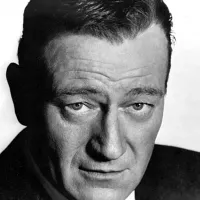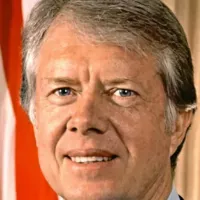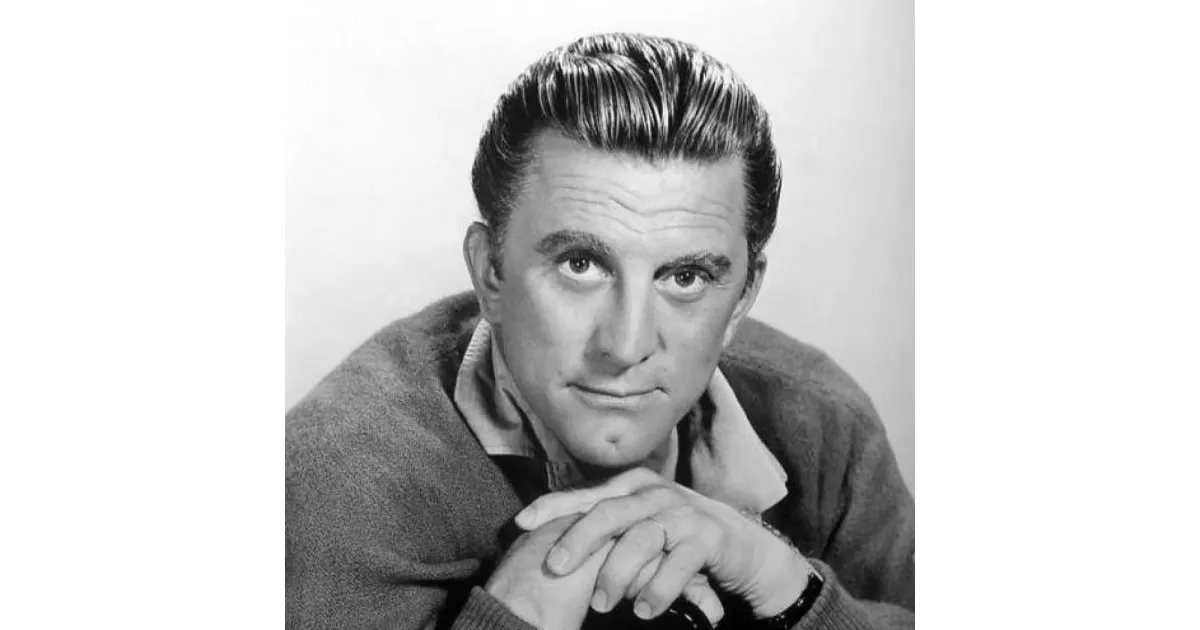"Kirk Douglas, a prominent American actor and filmmaker, rose from humble beginnings to become a celebrated figure in Hollywood. His career, spanning over 90 films, was marked by his powerful performances in a range of genres, particularly Westerns and war films. He achieved stardom in the 1950s and is recognized as one of the greatest male actors of Classic Hollywood by the American Film Institute."
December 9, 1916: Birth of Kirk Douglas
Issur Danielovitch, better known as Kirk Douglas, was born on December 9, 1916.
April 23, 1919: Birth of Anne Buydens
Anne Buydens, who would later become Kirk Douglas's wife, was born on April 23, 1919, in Hanover, Germany.
1934: "It Happened One Night" Achieves Academy Awards Sweep
In 1934, "It Happened One Night" became the first film to win all five major Academy Awards, setting a high bar for cinematic excellence.
1939: College Graduation
Kirk Douglas graduated with a bachelor's degree from St. Lawrence University in 1939.
1941: Joining the Navy
Kirk Douglas enlisted in the United States Navy in 1941, serving during World War II.
1941: The Attack on Pearl Harbor
On December 7, 1941, the Japanese launched a surprise attack on Pearl Harbor, Hawaii, a pivotal event that led to the United States' entry into World War II.
November 2, 1943: Marriage to Diana Dill
On November 2, 1943, Kirk Douglas married Diana Dill. They had two sons, Michael and Joel, before divorcing in 1951.
1943: Stage Break
Kirk Douglas' stage break came when he took over Richard Widmark's role in the play "Kiss and Tell" in 1943.
1944: Medical Discharge from the Navy
Kirk Douglas was medically discharged from the Navy in 1944 due to injuries sustained from a depth charge explosion.
1946: Film Debut
Kirk Douglas made his film debut in "The Strange Love of Martha Ivers" in 1946.
1946: Film Debut in "The Strange Love of Martha Ivers"
Kirk Douglas' debut film appearance was in "The Strange Love of Martha Ivers" with Barbara Stanwyck in 1946.
1947: Douglas and Lancaster's First Collaboration: "I Walk Alone"
Kirk Douglas and Burt Lancaster shared the screen for the first time in the 1947 film noir "I Walk Alone." This marked the beginning of a long and fruitful on-screen partnership that would span four decades.
1947: "Out of the Past" and "I Walk Alone" Release
Kirk Douglas appeared in "Out of the Past" and "I Walk Alone," his first film with Burt Lancaster, in 1947.
1947: "Out of the Past" Release
Kirk Douglas appeared in the film noir thriller "Out of the Past" in 1947.
September 1949: Bryna Productions Formation
In September 1949, Kirk Douglas formed his own production company, Bryna Productions, seeking greater control over his projects.
October 9, 1949: Jean Spangler Disappearance
On October 9, 1949, while Kirk Douglas was filming "Young Man with a Horn", bit actress Jean Spangler disappeared. Her purse was found with a note addressed to "Kirk", leading to Douglas being questioned by police. Douglas stated he was not the Kirk mentioned and had only spoken to Spangler on set.
1949: Rise to prominence with Champion
In 1949, Kirk Douglas starred in Champion, a role that catapulted him to stardom and marked his entry into Hollywood's superleague, comparable to Jack Nicholson's rise.
1949: Broadway Debut
Kirk Douglas made his Broadway debut in "Three Sisters," produced by Katharine Cornell, in 1949.
1949: Academy Award Nomination
Kirk Douglas received his first Academy Award nomination for Best Actor for his role in "Champion" in 1949.
1949: "Champion" and the Tough Guy Image
Kirk Douglas's tough-guy image was solidified with his role as a boxer in the film "Champion" in 1949.
1950: Dalton Trumbo Jailed
Dalton Trumbo was jailed for contempt of Congress in 1950.
1950: "Young Man with a Horn"
Douglas starred alongside Lauren Bacall and Doris Day in "Young Man with a Horn" in 1950.
1951: "Spartacus" Screenplay Adaptation
Howard Fast was originally hired to adapt his own 1951 novel "Spartacus" as a screenplay.
1951: Divorce from Diana Dill
In 1951, Kirk Douglas and Diana Dill divorced. They had two sons together, Michael and Joel.
1951: "Ace in the Hole" Released
Kirk Douglas starred in "Ace in the Hole", directed by Billy Wilder. While initially controversial, the film later gained recognition for Douglas's performance and is now considered a classic.
1951: First Western Role
Kirk Douglas starred in his first western, "Along the Great Divide," in 1951.
1951: Notable Film Releases
Kirk Douglas starred in two notable films in 1951: "Ace in the Hole" and "Detective Story," the latter earning him a Golden Globe nomination.
1952: Second Oscar Nomination
Douglas received his second Oscar nomination for his role in "The Bad and the Beautiful" opposite Lana Turner in 1952.
1952: "The Bad and the Beautiful" Released
Kirk Douglas starred in "The Bad and the Beautiful" as a ruthless film producer. The role earned him his third Oscar nomination.
1953: Film The Juggler
In 1953, Kirk Douglas starred in The Juggler, the first Hollywood feature filmed in Israel, portraying a Jew who eventually finds his Jewishness.
1953: Engagement to Pier Angeli
In the early 1950s, Kirk Douglas was engaged to Italian actress Pier Angeli after meeting on the set of The Story of Three Loves (1953), but they did not marry.
May 29, 1954: Marriage to Anne Buydens
On May 29, 1954, Kirk Douglas married Anne Buydens, whom he met in Paris while acting in Act of Love. They had two sons, Peter and Eric.
1954: Box Office Success with "20,000 Leagues Under the Sea"
Douglas starred with James Mason in the adventure film "20,000 Leagues Under the Sea" in 1954, which became a box office hit.
1954: "20,000 Leagues Under the Sea" and "The Jack Benny Program"
Kirk Douglas showcased his comedic side in Disney's "20,000 Leagues Under the Sea", playing a cheerful sailor alongside James Mason's Captain Nemo. He also appeared as a musical guest on "The Jack Benny Program".
1954: "Ulysses" Released
Kirk Douglas starred as the titular character in "Ulysses", a film adaptation of Homer's epic poem. The film also starred Silvana Mangano and Anthony Quinn.
1955: "Man Without a Star" Released
Kirk Douglas continued to demonstrate his comedic talent in the western "Man Without a Star".
1955: Bryna Productions Founded
Kirk Douglas established his own production company, Bryna Productions, after breaking contracts with Hal B. Wallis and Warner Bros. His first film under Bryna was "The Indian Fighter".
1955: Allegation of Assault Against Natalie Wood
Kirk Douglas is alleged to have raped actress Natalie Wood in the summer of 1955, when she was 16 and he 38.
1956: "Lust for Life" Released
Kirk Douglas delivered a critically acclaimed performance as Vincent van Gogh in "Lust for Life". The film, shot largely in France, highlighted Douglas's ability to convey the inner turmoil of the artist.
1956: Third Oscar Nomination and Golden Globe Win
Kirk Douglas received his third Oscar nomination and won a Golden Globe for Best Actor in a Drama for his portrayal of Vincent van Gogh in "Lust for Life" in 1956.
1957: "Paths of Glory" Released
Bryna Productions released "Paths of Glory", directed by Stanley Kubrick and starring Douglas. The anti-war film gained critical acclaim over time.
1957: Collaboration with Stanley Kubrick
Douglas worked with director Stanley Kubrick for the first time on the film "Paths of Glory" in 1957.
1957: "Gunfight at the O.K. Corral" - A Western Classic
Kirk Douglas and Burt Lancaster teamed up again in 1957 for the iconic Western "Gunfight at the O.K. Corral." Their on-screen chemistry and shared commitment to independent filmmaking contributed to their enduring legacy.
1957: "Top Secret Affair" Released
Kirk Douglas starred in "Top Secret Affair", showcasing his versatility in taking on roles in different genres.
March 22, 1958: Mike Todd's invitation
On March 22, 1958, Kirk Douglas's friend Mike Todd invited him to join him on his private aircraft to New York. They were playing tennis in Palm Springs that morning.
1958: Marriage and Pre-nuptial Agreement
In 1958, Kirk Douglas married Anne, but their union was marked by a controversial pre-nuptial agreement orchestrated by Douglas's agent, Sam Norton. Anne, distrustful of Norton's influence, later discovered that the agreement severely limited her and their children's financial security.
1958: "The Vikings" and Peter Vincent Music
Kirk Douglas starred in and produced "The Vikings" through Bryna Productions. He also founded the music publishing company Peter Vincent Music, a Bryna subsidiary, which handled the film's soundtrack.
1958: Financial Scandal and Fallout
Upon returning from filming in late 1958, Kirk Douglas was confronted with the revelation that his trusted agent, Sam Norton, had mismanaged his finances, leaving him in significant debt to the IRS. Douglas took legal action to sever ties with Norton and recoup some of his losses.
1959: "The Devil's Disciple" - A Period Drama
In 1959, Kirk Douglas and Burt Lancaster appeared together in "The Devil's Disciple," showcasing their versatility in period pieces.
January 20, 1960: Otto Preminger Hires Dalton Trumbo
On January 20, 1960, producer-director Otto Preminger announced that he had hired Dalton Trumbo to adapt Leon Uris' novel "Exodus" for the screen.
August 1960: Kirk Douglas Announces Trumbo as "Spartacus" Screenwriter
In August 1960, Kirk Douglas publicly announced that Dalton Trumbo was the screenwriter of "Spartacus".
1960: "Spartacus" Released
Kirk Douglas produced and starred in the historical epic "Spartacus", another successful production under his Bryna Productions company.
1960: "Spartacus" - A Defining Role
Kirk Douglas took on the titular role in the historical epic "Spartacus" in 1960. Serving as both star and executive producer, Douglas played a pivotal part in bringing this ambitious and expensive project to the screen.
1961: "Town Without Pity" Released
Kirk Douglas starred in "Town Without Pity", continuing to portray diverse characters throughout his career.
1962: "Lonely Are the Brave" Released
Kirk Douglas both starred in and produced "Lonely Are the Brave", showcasing his continued involvement in projects under his production company, Bryna.
1963: Douglas Brings "One Flew Over the Cuckoo's Nest" to Stage
In 1963, Kirk Douglas acquired the rights to Ken Kesey's novel "One Flew Over the Cuckoo's Nest" and brought it to the Broadway stage, starring in the production himself.
1963: "The List of Adrian Messenger" - A Mystery Thriller
Kirk Douglas and Burt Lancaster reunited in 1963 for the mystery thriller "The List of Adrian Messenger." While Lancaster had a cameo role, Douglas took on a villainous character, further solidifying their reputation as a dynamic duo.
1963: "For Love or Money" Released
Kirk Douglas further displayed his range in the comedy "For Love or Money".
1963: "The Hook" Released
Kirk Douglas starred in "The Hook", further solidifying his presence as a prominent actor in Hollywood.
1963: Broadway Debut
Kirk Douglas starred in the Broadway play "One Flew Over the Cuckoo's Nest" in 1963, a story he later gave to his son Michael Douglas to adapt into a film.
1964: Frankenheimer Directs "Seven Days in May"
Director John Frankenheimer, initially hesitant to cast Burt Lancaster in "Seven Days in May" (1964) due to past conflicts, ultimately agreed at Kirk Douglas's insistence. Frankenheimer and Lancaster's collaboration proved successful, resulting in a memorable performance by Lancaster in the film.
1964: "Seven Days in May" Release
Douglas starred opposite Burt Lancaster in "Seven Days in May" in 1964, marking their seventh film together.
1964: "Seven Days in May" - A Political Thriller
In 1964, Kirk Douglas and Burt Lancaster collaborated on the political thriller "Seven Days in May." Their performances and the film's gripping narrative cemented their status as leading men in Hollywood.
1965: "Heroes of Telemark" and "In Harm's Way" Released
Kirk Douglas starred in two films, "Heroes of Telemark" and "In Harm's Way", both of which showcased his ability to portray characters in dramatic and action-packed narratives.
1966: Film Cast a Giant Shadow
In 1966, Kirk Douglas starred in Cast a Giant Shadow, a film with an underlying theme about a Jew who eventually finds his Jewishness.
1966: Produced and directed Cast a Giant Shadow
In 1966, Kirk Douglas starred in Cast a Giant Shadow, produced and directed by Melville Shavelson, who noted Douglas's intense dedication to his roles.
1966: "Cast a Giant Shadow" and "Is Paris Burning?" Released
Kirk Douglas starred in two films, "Cast a Giant Shadow" and "Is Paris Burning?", demonstrating his continued prominence in the film industry.
1967: "The War Wagon" - A Western with Wayne and Douglas
In 1967, Kirk Douglas joined forces with John Wayne in the Burt Kennedy-directed Western "The War Wagon." The film capitalized on the star power of both actors, drawing audiences to this action-packed genre picture.
1968: Kirk Douglas Award
In 1968, Maria Riccio Bryce won the Thespian Society's Kirk Douglas Award at Kirk Douglas's former high school.
1969: "The Arrangement" - A Critical and Commercial Disappointment
In 1969, Kirk Douglas starred alongside Faye Dunaway in Elia Kazan's drama "The Arrangement." Despite their performances, the film failed to resonate with audiences and critics, becoming a box office disappointment.
1970: "There Was a Crooked Man..." - A Western Comedy
In 1970, Kirk Douglas appeared in "There Was a Crooked Man...," a Western comedy that blended action and humor.
1971: "A Gunfight" and "The Light at the Edge of the World" Released
Kirk Douglas starred in two films released in 1971: the Western "A Gunfight" and the adventure film "The Light at the Edge of the World." These roles showcased his versatility and enduring appeal in action-oriented stories.
1973: "Scalawag" - Douglas's Directorial Debut
In 1973, Kirk Douglas stepped behind the camera to direct "Scalawag." This marked his first foray into directing, expanding his creative horizons beyond acting.
1975: "One Flew Over the Cuckoo's Nest" Wins Big at the Academy Awards
In 1975, the film adaptation of "One Flew Over the Cuckoo's Nest," produced by Kirk Douglas's son, Michael, and starring Jack Nicholson, achieved critical acclaim by winning all five major Academy Awards.
1975: "Posse" - Douglas Directs and Stars
Kirk Douglas directed and starred in the 1975 Western "Posse," further demonstrating his commitment to exploring different facets of filmmaking. He shared the screen with Bruce Dern in this gritty tale of the American West.
1976: "Paths of Glory" Unbanned in France
"Paths of Glory", the critically acclaimed anti-war film starring Kirk Douglas, was finally allowed to be screened in France after being banned since its release.
1976: "Victory at Entebbe" - A Historical Drama
Kirk Douglas and Burt Lancaster continued their on-screen partnership in 1976 with "Victory at Entebbe," a historical drama based on real events.
1978: "The Fury" - A Supernatural Thriller
Kirk Douglas took on a role in the supernatural thriller "The Fury" in 1978. The film explored themes of psychic abilities and revenge.
1980: Meeting with Anwar Sadat
In 1980, Kirk Douglas flew to Cairo to talk with Egyptian President Anwar Sadat.
1980: Continued Acting Career
Kirk Douglas continued acting, appearing in films like "Saturn 3" and "The Man from Snowy River" in 1980.
1980: "The Final Countdown" and "Saturn 3" Released
Kirk Douglas starred in "The Final Countdown" and "Saturn 3", marking his continued presence in the science fiction genre.
1980: "The Final Countdown" - A Time-Travel Thriller
Kirk Douglas starred in the 1980 science fiction film "The Final Countdown," playing the commanding officer of an aircraft carrier transported back in time to the eve of the Pearl Harbor attack. The film, produced by his son Peter Douglas, combined historical events with a thought-provoking premise.
1981: Presidential Medal of Freedom
Kirk Douglas received the Presidential Medal of Freedom from President Jimmy Carter in 1981 for his work as a goodwill ambassador.
1982: Film Remembrance of Love
In 1982, Kirk Douglas starred in Remembrance of Love, continuing the theme of a Jew who eventually finds his Jewishness.
1982: "The Man from Snowy River" - An Australian Success
In 1982, Kirk Douglas took on a dual role in the critically acclaimed Australian film "The Man from Snowy River." The film's success further solidified Douglas's international appeal and ability to captivate audiences across genres.
1983: S. Roger Horchow Award
In 1983, Douglas received the S. Roger Horchow Award for Greatest Public Service by a Private Citizen, an award given out annually by Jefferson Awards.
1986: Reunion with Burt Lancaster
Douglas reunited with Burt Lancaster for the film "Tough Guys" in 1986.
1986: "Tough Guys" - A Final Collaboration
In 1986, Kirk Douglas and Burt Lancaster shared the screen for the last time in the crime comedy "Tough Guys." This marked the culmination of their four-decade collaboration, leaving an unforgettable mark on cinematic history.
1986: "Tough Guys" and Statue of Liberty Celebration
In 1986, Kirk Douglas reunited with Burt Lancaster for their final film together, "Tough Guys." That same year, he co-hosted the New York Philharmonic's tribute to the Statue of Liberty's centennial alongside Angela Lansbury.
1988: Television adaptation of Inherit the Wind
In 1988, Kirk Douglas starred in a television adaptation of Inherit the Wind alongside Jason Robards and Jean Simmons. The film won two Emmy Awards.
1988: Television Appearance
Kirk Douglas appeared in the television version of "Inherit the Wind" in 1988.
1988: Autobiography Publication
Kirk Douglas published his autobiography, "The Ragman's Son," in 1988, detailing his early life and family struggles.
February 13, 1991: Helicopter crash
On February 13, 1991, Kirk Douglas was injured in a helicopter crash that collided with a small plane. This near-death experience led him to embrace Judaism more deeply.
1991: AFI Life Achievement Award
George Stevens, while presenting Kirk Douglas with the AFI Life Achievement Award, praised Douglas's willingness to portray the "dark, desperate side of the soul" in his roles, likely referencing his performance in films like "Ace in the Hole".
1991: Helicopter Crash
Kirk Douglas survived a helicopter crash in 1991.
1992: Roles in The Secret and Greedy
In 1992, Kirk Douglas starred in a television movie, The Secret, about a grandfather and his grandson dealing with dyslexia. He also played the uncle of Michael J. Fox in the comedy Greedy.
January 28, 1996: Kirk Douglas Suffers Stroke
On January 28, 1996, at age 79, Kirk Douglas suffered a severe stroke, which impaired his ability to speak.
1996: Honorary Academy Award
In 1996, Kirk Douglas received an Honorary Academy Award for "50 years as a moral and creative force in the motion picture community."
1996: Severe stroke at age 79
In 1996, at the age of 79, Kirk Douglas suffered a severe stroke that impaired his ability to speak. Despite this, he underwent years of voice therapy and continued to make movies.
1996: Stroke
Kirk Douglas suffered a stroke in 1996.
1997: Publication of Climbing the Mountain: My Search for Meaning
In 1997, Kirk Douglas published Climbing the Mountain: My Search for Meaning, documenting his spiritual journey following a near-death experience in 1991.
1999: Scholarship fund at St. Lawrence University
In 1999, Kirk Douglas began a scholarship fund at St. Lawrence University, his alma mater.
1999: Film Diamonds
In 1999, after recovering from his stroke, Kirk Douglas starred in the film Diamonds, where he played an old professional boxer recovering from a stroke. The film co-starred his longtime friend Lauren Bacall.
1999: Second Bar-Mitzvah ceremony
In 1999, at the age of 83, Kirk Douglas celebrated a second Bar-Mitzvah ceremony, reflecting his deep convictions and Jewish identity.
2000: Interview about Jewish identity
In 2000, Kirk Douglas discussed his transition towards embracing his Jewish identity in an interview, reflecting a theme that had become significant in his life.
September 2001: Funding high school's musical
In September 2001, Kirk Douglas helped fund his high school's musical, Amsterdam Oratorio, composed by Maria Riccio Bryce.
2001: Publication of Suzanne Finstad's Biography of Natalie Wood
Wood's alleged rape was first publicized in Suzanne Finstad's 2001 biography of the actress, though Finstad never named the offender.
2002: Emmy Award Nomination
Douglas received his third Emmy Award nomination for his role in an episode of "Touched by an Angel" in 2002.
2002: Publication of "My Stroke of Luck"
Kirk Douglas wrote about his experience with a stroke in his 2002 book "My Stroke of Luck".
2003: Produced It Runs in the Family
In 2003, Michael and Joel Douglas produced It Runs in the Family, featuring Kirk Douglas and various family members, including Michael, Michael's son Cameron, and Kirk's former wife, Diana Dill.
July 6, 2004: Death of son Eric
On July 6, 2004, Kirk Douglas's son Eric died from an overdose of alcohol and drugs at the age of 46.
2004: Final feature-film appearance in Illusion
In 2004, Kirk Douglas made his final feature-film appearance in Illusion, where he played a dying film director forced to watch episodes from the life of a son he had refused to acknowledge.
2004: Anne Buydens's conversion to Judaism and renewal of vows
In 2004, Kirk Douglas's wife Anne Buydens converted to Judaism, and they renewed their wedding vows.
2004: Opening of the Kirk Douglas Theatre
Kirk Douglas opened the Kirk Douglas Theatre in Culver City in 2004.
2006: Letter to Jimmy Carter
In 2006, Kirk Douglas wrote to former president Jimmy Carter to stress the importance of Israel.
2006: Establishment of Kirk Douglas Award
Since 2006, the Santa Barbara International Film Festival has awarded the Kirk Douglas Award for Excellence in film to acknowledge lifetime contributions to the film industry.
2007: Publication of "Let's Face It"
Kirk Douglas published his memoir, "Let's Face It", in 2007.
2008: Oldest Celebrity Blogger
As of 2008, Kirk Douglas was believed to be the oldest celebrity blogger in the world.
2008: Last screen role in Empire State Building Murders
In 2008, Kirk Douglas had his last screen role in the TV movie Empire State Building Murders.
March 2009: Performed Before I Forget
In March 2009, at the age of 92, Kirk Douglas performed an autobiographical one-man show, Before I Forget, at the Center Theatre Group's Kirk Douglas Theatre in Culver City, California. The performances were filmed and turned into a documentary.
January 2010: Documentary screening of Before I Forget
In January 2010, the filmed performances of Kirk Douglas's one-man show, Before I Forget, were turned into a documentary and screened.
2012: Anonymous Blog Post
An anonymous blog post accusing Kirk Douglas of assaulting Natalie Wood was published in 2012.
2012: Donation to St. Lawrence University
In 2012, Kirk Douglas donated $5 million to St. Lawrence University, his alma mater, for the scholarship fund he began in 1999.
2012: Douglas Takes Pride in Breaking the Blacklist
In 2012, Kirk Douglas reflected on his career, expressing immense pride in his role in breaking the Hollywood blacklist by giving full credit to screenwriter Dalton Trumbo for "Spartacus" (1960).
2012: Move to Huffington Post
Kirk Douglas's blog posts were hosted by the Huffington Post beginning in 2012.
2014: 60th wedding anniversary
In 2014, Kirk Douglas and Anne Buydens celebrated their 60th wedding anniversary at the Greystone Mansion in Beverly Hills.
2014: Kirk Douglas Names Films He's Most Proud Of
In a 2014 article, Kirk Douglas cited several films as those he was most proud of throughout his acting career.
March 2015: Donation to Children's Hospital Los Angeles
In March 2015, Kirk Douglas and his wife donated $2.3 million to the Children's Hospital Los Angeles.
December 9, 2015: Donation to Harry's Haven
To celebrate his 99th birthday on December 9, 2015, Kirk Douglas and his wife donated another $15 million to Harry's Haven, an Alzheimer's treatment facility, to help expand the facility with a new two-story Kirk Douglas Care Pavilion.
2015: Star Nicknamed After Kirk Douglas
In 2015, a star was nicknamed after Kirk Douglas in the International Star Registry to commemorate his 99th birthday.
2015: "Trumbo" - A Cinematic Portrayal
In 2015, the film "Trumbo" was released, chronicling the life and career of Dalton Trumbo. Dean O'Gorman portrays Kirk Douglas in the film, highlighting Douglas's role in challenging the Hollywood blacklist.
December 9, 2016: 100th birthday celebration
On December 9, 2016, Kirk Douglas celebrated his 100th birthday at the Beverly Hills Hotel with friends and family, including Don Rickles, Jeffrey Katzenberg, Steven Spielberg, his wife Anne, his son Michael, and daughter-in-law Catherine Zeta-Jones.
2017: Release of Kirk and Anne: Letters of Love, Laughter and a Lifetime in Hollywood
In 2017, Kirk Douglas and Anne Buydens released a book titled Kirk and Anne: Letters of Love, Laughter and a Lifetime in Hollywood, which revealed intimate letters they shared over the years.
January 2018: Renewed Attention to Allegations
The allegation against Kirk Douglas received renewed attention in January 2018, after the 75th Golden Globe Awards ceremony paid tribute to Douglas, with several news outlets citing a 2012 anonymous blog post which accused Douglas.
July 2018: Lana Wood's Statement
In July 2018, Natalie Wood's sister Lana said during a 12-part podcast about her sister's life that her sister was sexually assaulted as a teen and that the attack had occurred inside the Chateau Marmont during an audition and went on "for hours".
2018: Appearance at the Golden Globes
In 2018, Kirk Douglas made a rare public appearance at the Golden Globes with his daughter-in-law Catherine Zeta-Jones. He received a standing ovation and helped present the award for 'Best Screenplay – Motion Picture.'
February 5, 2020: Death of Kirk Douglas
Kirk Douglas passed away on February 5, 2020.
February 7, 2020: Funeral of Kirk Douglas
Kirk Douglas's funeral was held at the Westwood Village Memorial Park Cemetery, on February 7, 2020, two days after his death. He was buried in the same plot as his son, Eric.
2020: Endorsement of Michael Bloomberg
During the 2020 Democratic Party presidential primaries, Kirk Douglas endorsed Michael Bloomberg's campaign.
2020: Passing Away
Kirk Douglas passed away in 2020.
April 29, 2021: Death of Anne Douglas
On April 29, 2021, Kirk Douglas's wife Anne died at the age of 102 and was buried next to him and their son.
2021: Publication of "Little Sister: My Investigation Into the Mysterious Death of Natalie Wood"
In the 2021 memoir "Little Sister: My Investigation Into the Mysterious Death of Natalie Wood", Lana Wood alleged Kirk Douglas was her sister's assailant.
Mentioned in this timeline

Michael Bloomberg is an American entrepreneur politician and philanthropist He...

Steven Spielberg is a highly influential American filmmaker recognized as...
California is a U S state on the Pacific Coast...

John Wayne born Marion Robert Morrison and nicknamed Duke was...

Jimmy Carter the th U S President - was a...
Germany officially the Federal Republic of Germany is a nation...
Trending

Matt Weston is a highly accomplished English skeleton racer He boasts a remarkable career highlighted by two World Championship titles...

11 minutes ago Austin Florian's Olympic Helmet Appeal Fails: Honoring Ukraine Amidst Controversy.

1 hour ago Kevin Fiala injured during Switzerland vs. Canada Olympics game, stretchered off ice.
1 hour ago Bride integrates Bad Bunny Super Bowl halftime into wedding; Republicans react to performance.

1 hour ago Brewers sign Luis Rengifo to a one-year deal, adding infield depth.

2 hours ago Presidents' Day Sales: Early Deals on Amazon, Apple, Carhartt, and Sealy products.
Popular

Kid Rock born Robert James Ritchie is an American musician...
The Winter Olympic Games a major international multi-sport event held...

Barack Obama the th U S President - was the...

XXXTentacion born Jahseh Dwayne Ricardo Onfroy was a controversial yet...

Pam Bondi is an American attorney lobbyist and politician currently...

Michael Joseph Jackson the King of Pop was a highly...
